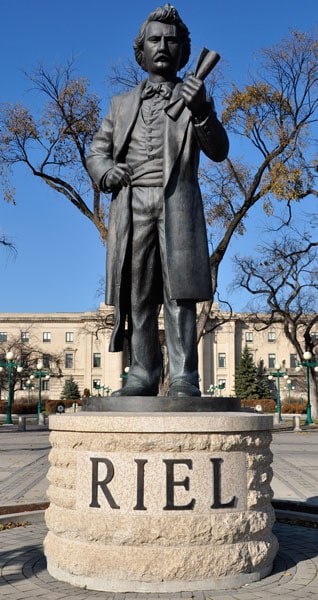 TYREL ESKELSON
TYREL ESKELSON
Opinions Writer
As you enter the doors of Place Riel you may notice a plaque honouring the Canadian historical figure, Louis Riel. It tersely outlines his past, the final line reading, “His name is synonymous with leadership in the fight for Aboriginal, Métis, and minority rights.”
It seems that today, most Canadians remember Louis Riel (if the nomenclature of many prairie streets, highways and buildings are any indication) as a hero of the Métis and their fight for equality.
This is a faint-hearted, simplistic view, which says nothing of Riel’s selfish motives and aspirations.
There are several key events surrounding Riel which suggest that not only was he not the hero he is so often presented as but was responsible for several blunders that did nothing but hinder the Métis’ chance at addressing their grievances through politics and rebellion.
Riel’s zealous religiosity and borderline insanity led him to use the grievances of the Métis people (a group which had every right to rebel) as a means to his own self-interested ends.
Riel’s family had strong ties to the religious community and he was raised in an atmosphere that was quite pious. He was chosen to travel to Québec, and entered studies that would eventually lead to priesthood. After his fathers’ death in 1865, Riel withdrew from his studies and eventually moved back home, quickly becoming involved in discussions regarding the political and economic status of the Red River area. Here he found massive support and rose to a position of considerable authority within the Métis community.
The first action Riel undertook as leader of the Métis was to disrupt the Canadian surveyors as they crossed into the Red River area in October 1869. With a group of armed Métis followers, they were able to take control of a Hudson Bay trading post called Fort Garry and defended their territory in a subsequent raid by government troops, during which the Métis captured several of their attackers.
This is when Riel made his first gaffe as the Métis leader, executing Thomas Scott, a member of the attacking Canadian faction.
News of the execution spread quickly, and caused widespread outrage in Eastern Canada. The next summer, a military expedition came to establish peace in the newly created province of Manitoba. Riel was forced to flee into exile where he would remain for more than 10 years.
During his time in exile, Riel concerned himself with religious matters more so than he did political issues. Riel undertook several mystical visionary experiences which he looked upon as an inauguration of his role as the prophet of the new world, and became convinced that he was the divinely chosen leader of the Métis.
After being admitted to a psychiatric hospital in 1878, Riel produced religious writings and continued to harbour an assumption of self-apotheosis. He began inscribing his name as “Louis David Riel” for the reason that he believed he was the David of the new world. According to Riel, these were not self-affirmations but an expression of a direct anointment from God.
Riel later established a small government called the Exovedate in which religion and politics were inextricably combined. Here he was able to proselytize his new religious affirmations and was able to convince his followers to recognize him as a prophet with an authority of divine inspiration.
As an anointed prophet from God — and with a sizeable following who believed this to be so — Riel expected to triumph in what would become the North West Rebellion.
With the rebellion well underway, Riel continued to hinder the Métis’ progress. Gabriel Dumont’s attack at Fish Creek was continually halted to say the rosary. Dumont in many cases did not agree with Riel’s strategy, saying, “I yielded to Riel’s judgement. Although I was convinced that from a humane standpoint, mine was the better plan, I had confidence in his faith, and that God would listen to him.”
To borrow a phrase from Trotsky, the end may justify the means if there is something to justify the end. If one looks at Riel’s goals, it becomes painfully obvious that they far outreached the Métis’ justification for rebellion. Riel believed that he would be able to successfully defeat the Canadian Government and eventually reform Canada’s religious and political climate. Riel even believed it was possible to relocate the papacy to Canada, and was convinced that this and more could be achieved because God had appointed him as the prophet of the Métis people.
It seems clear to me that Riel’s time as leader did nothing but derail and hinder their cause.
The evidence can lead us to only one of two conclusions. The first is that Riel was a religious crackpot whose apotheosis appointment hindered and harmed the Métis cause in the fight for equality and dissent. The second possibility is that he was mentally ill and in need of psychiatric care.
There are valid arguments for either side, but a hero or idol he was not.
– –
image: Stephen Zacharias/Flickr
Leave a Reply